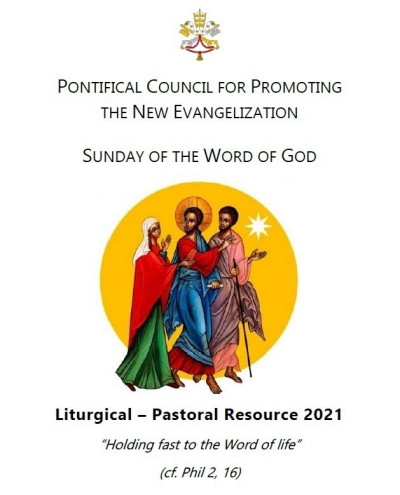Liturgical – Pastoral Resource 2021

Holding fast to the Word of life (Phil 2:16)
This year the biblical phrase for celebrating the Sunday of the Word of God is taken from the Letter to the Philippians: “Holding fast to the Word of life” (Phil 2:16). As can be understood from some references, the Apostle is writing the letter from prison. It is certainly one of the Church’s most important texts. The Christological passage in which Paul highlights the kenosis fulfilled by the Son of God in becoming man remains throughout our history as a point of reference of no return for understanding the mystery of the Incarnation. The liturgy has never ceased praying with this text. Theology has made it one of the main elements for understanding the faith. In these words the Christian witness finds the foundation for building love-filled service. While the letter expresses the essential substance of the apostle's preaching, it also shows how important it is for the Christian community to increase its knowledge of the Gospel.
With our verse, the apostle offers an important lesson to the Christian community to show them the way they are called to live in the world. First of all, it recalls the importance that Christians must give to their commitment to salvation, precisely by virtue of the event achieved by the Son of God in becoming man and offering himself to the violence of death on the cross: “work out your own salvation with fear and trembling” (Phil 2:12). No Christian can think of living in the world apart from this event of love that has transformed his life and all of history. Of course, Paul does not forget that no matter how hard Christians may work at attaining salvation, it is always the primacy of God's action that remains: “for it is God who is at work in you, enabling you both to will and to work for his good pleasure” (Phil 2:13). The combination of these two elements provides insight into the challenging words that the apostle now gives to the Christians of Philippi, having before his eyes the believers who over the centuries will be disciples of the Lord.
The first commitment that believers are required to make is consistency of life. The call to be “blameless” and “upright” in the midst of a world where deception and cunningness often predominate refers to the words of Jesus when he invited his disciples: “See, I am sending you out like sheep into the midst of wolves; so be wise as serpents and innocent as doves” (Mt 10:16). For this to happen, Paul shows the way: Christians need to remain faithful and united to the Word of God. “Holding fast to the Word of life” Christ’s disciples “shine like stars in the world”. It is a beautiful image that the apostle offers to all of us today, as well. We are living in a dramatic time. Humanity thought it had reached the most solid certainties of science and an economy of solutions to ensure security of life. Today it is forced to admit that neither of these guarantees a future. Disorientation and mistrust emerge strongly due to unexpected uncertainty. Also in this situation, Christ’s disciples have the responsibility of offering a word of hope. They can achieve this insofar as they remain firmly anchored to the Word of God, which generates life and presents itself as full of meaning for personal existence.
Perhaps the most authoritative interpretation of this verse is that of Victorinus. The great Roman rhetorician, whose conversion was described by Augustine in the Confessions, who wrote in his Commentary to the Philippians: “I glory in you because you possess the Word of life, that is, because you know Christ, who is the Word of life, because what is done in Christ is life. Therefore Christ is the Word of life, from this we perceive how great are the profit and the glory of those who govern the souls of others”. On the Sunday of the Word of God, rediscovering the responsibility to work so that this Word may grow in the hearts of believers and animate them with joy for evangelization is a wish that becomes prayer.
Rino Fisichella



